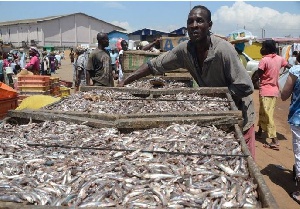West Africa demonstrates leadership in good fisheries governance with a regional strategy aimed at implementing the Fisheries Transparency Initiative (FiTI) in the sub-region. Guinea and Mauritania led the way.
On the initiative of the Regional Partnership for Coastal and Marine Conservation (PRCM) and welcomed in Guinea, one of the first countries that engaged in the Fisheries Transparency Initiative (FiTI), actors of the fisheries sector in West Africa gathered to jointly advance transparent and inclusive fisheries, conditions deemed essential to achieve sustainable management of a sector that is vital for the population of the sub-region.
“The sustainability of our fish resources can only be achieved through good governance of the sector, based on principles of transparency and participation. These principles have become our priority, which is why the Republic of Guinea has committed since 2016 to implement the FiTI”, said H.E. Fr?d?ric Loua, Minister of Fisheries and Marine Economy of the Republic of Guinea. “Our wish is that Guinea becomes a pioneer of transparency in the sector”.
In a context where West African coastal countries are often faced with the same scourges, an adherence of all these countries to the principles of transparency would make it possible to manage these challenges collectively, for instance by facilitating the fight against Illegal, Unreported and Undocumented (IUU) fishing. More transparency at the sub-regional level would also enable better management of shared stocks, particularly small pelagic stocks, which represent 77% of all catches in the sub-region and are vital for food and nutrition security.
“Making fisheries management more transparent and inclusive throughout the region can be a key tool to tackle such challenges collectively”, said Prof. Dr. Peter Eigen, Chair of the Fisheries Transparency Initiative (FiTI) from Berlin.
According to the workshop participants, representing governments, business and civil society from the Gambia, Guinea, Guinea-Bissau, Mauritania, Senegal and Sierra Leone, this need for collective action starts at the national level. It starts with an enhanced need for collaboration amongst all actors of the sector to stimulate an active demand for accountability and fuel public debates on how the fisheries sector is managed.
For these representatives, the FiTI, with its platform that encourages dialogue and helps build trust amongst stakeholders, appears to be a strategic tool to support efforts towards sustainable fisheries that benefit all throughout the world.
“We are proud that the FiTI was launched in West Africa”, said Ahmed Senhoury, Director of the Regional Partnership for West Africa Coastal and Marine Conservation (PRCM). “It is our responsibility to advance this initiative at the highest level”.
It is in this spirit that, in a final declaration, the workshop participants urged West African countries to continue their efforts to implement the FiTI, thereby showing their willingness to take up the role of torch-bearers of the initiative at the international level.
Business News of Monday, 9 July 2018
Source: governance-platform.org

















